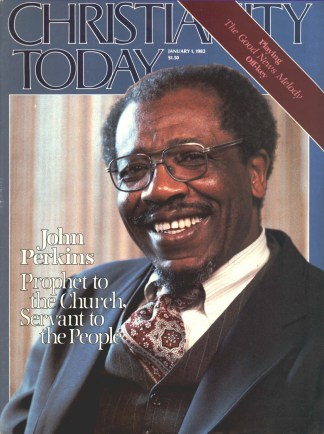They have unlisted telephone numbers. They get two or three letters daily, mostly from worried parents asking for help. The threat of lawsuits is constant, heard like Muzak droning in the background. They sometimes fear for the safety of their families.
And so the cult watchers, as they have been called, were happy to congregate in San Diego recently for the third annual Cult Summit Conference. About 90 attended, reading and hearing papers, developing strategies, and commiserating with each other on what one called “this rather insane enterprise we’ve been involved in so long.”
The conference was sponsored by Spiritual Counterfeits Project, based in Berkeley, California, and a handful of leading evangelical cult watchers. It was different from the preceding two conferences in that wider viewpoints were represented. Although most participants were evangelicals, some voices from the Jewish and nonreligious academic communities were heard as well.
Rabbi Steve Robbins opened the conference. The chairman of the Task Force on Cult and Missionary Actions for the Jewish Community, Robbins eloquently conveyed the “persistent sense of loneliness” he feels after 10 years of striving to keep Jews out of the cultic web.
“We are running to catch up to a reality that has staggered our imaginations, shaken our conceptions of what religion is, and even what human beings are,” Robbins said. He claimed the personal dimension of the issue is hardest to deal with, exhorting his listeners to determine “what it is that can be done to other people in the name of religion and what we can do in the name of God to stop it.”
Robbins blamed deficiencies in society for the popularity of cults. Children are raised to have their sense of self depend on others. Thus the popularity of designer jeans, the rabbi noted. Children soon learn that “if you are going to be accepted you’ve got to wear somebody’s name.… We are either somebody else going or somebody else coming.”
Robbin’s bluntest words were saved for last, when he said, “Evangelical Christians now know what it is like to be evangelized.” He challenged evangelicals not to evangelize Jews, but to busy themselves with the unchurched. He condemned Jews for Jesus, a Christian mission to Jews, as a “prevarication of Christianity, a lie.” Evangelical listeners praised Robbins for his “courage” in challenging the evangelism of Jews, but asserted they must obey the Great Commission.
The rest of the conference roster included almost all recognized evangelical authorities on the cults. Walter Martin, author of The Kingdom of the Cults, spoke on lessons from his 30-year battle with cults ranging from Jehovah’s Witnesses to the Rosicrucians. James Bjornstad, founder of the Institute of Contemporary Christianity, addressed the difference between cultic and Christian conversion.
Ronald Enroth, author of The Lure of the Cults, told how cults go about becoming legitimate and widely accepted (see box). Brooks Alexander of Spiritual Counterfeits Project warned his colleagues that humanism is passing from its secular phase to cosmic humanism, a mixture of rationalism and Eastern occultism.
Alexander said public education is the “prime target” for proponents of cosmic humanism because “it influences the most people in the most pervasive way at the most impressionable age.” Groups such as Werner Erhard’s “est” entertain ambitions of getting their training into school curriculums. The originator of “confluent education,” already taught in some California public schools, has written that her curriculum is based on the idea that “we are all God, … we have the attributes of God.”
The spread of cosmic humanism makes the possibility of a Christian’s unknowing involvement in non-Christian spirituality “very real today,” Alexander said. “Many of the teachings, trainings and treatments offered by ‘new age,’ ‘holistic,’ and ‘human potential’ groups affect the individual in ways that go far beyond their expressed secular purpose.”
The participants were especially interested in a talk by Margaret Singer, a psychologist at the University of California at Berkeley. Singer testifies frequently at trials involving cult members and is regarded as a leading expert on brainwashing. She said brainwashing is a poor term, “a far more Madison Avenue term than most of us want.”
But a process that could be called brainwashing definitely occurs in some cults, Singer said. In fact, “modern cults are more successful with peer and social influence than [North] Koreans [in the Korean War] were with a gun at the head.”
Brainwashing techniques include chanting, which can lead to hyperventilation. The hyperventilation produces a feeling similar to drunkenness. Cultic speakers often select a member of the audience with vivid breathing, then speak to the rhythm of that person’s rising and falling chest. Speaking softly causes the listeners to concentrate more and, surprisingly, it is “easier to induce trances if you don’t make sense because listeners fill in the gaps and listen harder.”
Conference organizers appreciated the wide range of backgrounds of the speakers, saying it helps to take an integrative approach to the problem of the cults. Some participants, however, believed the conference should have focused on theological issues. Dave Hunt, author of The Cult Explosion, protested that prayers were not said before every session and wondered if the evangelical cult watchers were preoccupied with academic respectability. Hunt went so far as to call psychology “the Trojan horse that has entered the church to destroy it.”
Thirty years ago, Walter Martin said, most churches would not take him seriously when he said he wanted to speak on the cults. Today, Martin and the others have more calls for help and information than they can begin to answer. The cults, it seems, are no longer taken lightly.
How Moonies Win Friends And Influence People
Paul doesn’t list it as one of the gifts of the Holy Spirit, but a flair for public relations is probably the most important asset for cults wanting legitimacy in the eyes of society. Sociologist Ronald Enroth described the public relations ploys of several cults in a paper presented at the San Diego conference on the cults.
Enroth quoted the director of a public relations firm who said early Mormons Joseph Smith and Brigham Young were public relations masters. He also claimed Mormon Tabernacle Choir recordings with the Philadelphia Orchestra came as the product of a “professional, non-Mormon public relations firm.”
Sun Myung Moon’s Unification Church works hard to associate itself with respected celebrities and thereby earn public acceptance. Moon has received official letters or certificates from more than 200 governors and mayors, including Jimmy Carter when he was governor of Georgia, former Alabama Governor George Wallace, and Los Angeles Mayor Tom Bradley. Evangelical author Richard Quebedeaux has worked for the Moonies, and cult officials use his name to lend credibility to themselves.
One of the Moonies’ most insidious tricks is to solicit good wishes for special events and invite dignitaries who probably won’t come, then transform the dignitaries’ telegrams of polite regrets into letters of endorsement.
Thus the Moonies can quote former Mayor John Lindsay as saying that “New York appreciates the contribution of the Unification Church to the life of our great city.” Likewise, William F. Buckley, Jr., has sent his “heartiest wishes,” Senator Strom Thurmond has wished the group success in its “campaign for Christ,” and Senator Jesse Helms has praised Sun Myung Moon as “a Christian in our increasingly secular society.”
The Moonies image building is so effective that Enroth believes that within 15 years the cult will be as widely accepted as the Mormon church is today.










